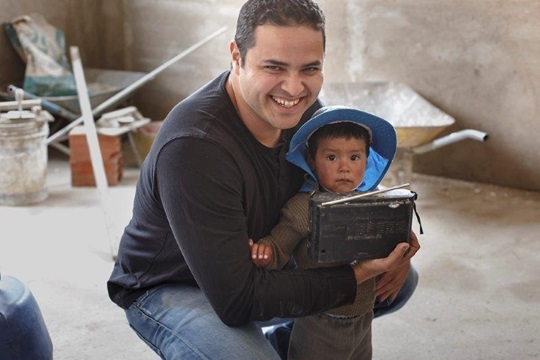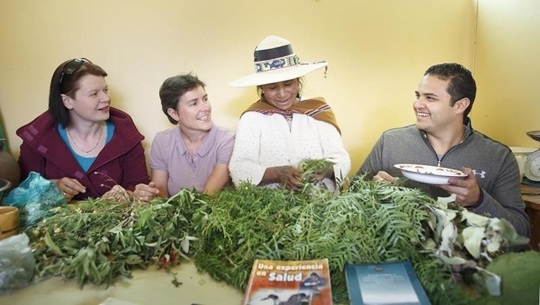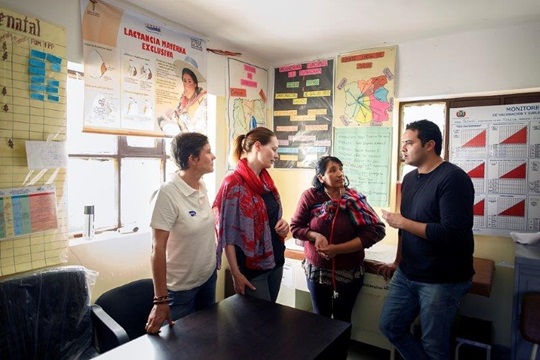“I learnt so much in Bolivia. It has brought me to a whole new level of self-awareness,” says Fernando. We asked him to share his experiences from his time in Bolivia.
I’ll always remember the day I came to work and heard about HARTMANN’s partnership with CARE. It was the start of a whole new chapter of my life.

Get ready!
To be completely honest, I didn’t know anything about CARE. Now I know that it’s one of the most active non-governmental organisations globally. I also learnt that the main aim of our partnership was to improve healthcare conditions in developing countries. And that included a unique opportunity for us to volunteer to help. It took me less than a minute to decide to apply. A few weeks later I got the message: I was going to Bolivia. I couldn’t believe I had this incredible opportunity.
I started to learn more about the country, its healthcare challenges and its culture. The World Health Organisation (WHO) made it clear that while there had been good progress on health-related Millennium Development Goals in Bolivia, there was still a long way to go. Life expectancy of 68 is still eight years shorter than average for the region. However, it was the expectancy of a healthy life of only 59 years that really motivated me to contribute.
I had other work to do too. My boss challenged me to lose weight: he was concerned about the impact of the altitude in Bolivia. I already knew, in my heart of hearts, I needed to exercise more and this was the impetus I needed. To really encourage me, for every kilo I lost, my boss donated $1,000 to charity. I accepted the challenge and lost 12kg. The encouragement from HARTMANN’s social media fans and followers was amazing and really helped me get through the challenge.
To be completely honest, I didn’t know anything about CARE. Now I know that it’s one of the most active non-governmental organisations globally. I also learnt that the main aim of our partnership was to improve healthcare conditions in developing countries. And that included a unique opportunity for us to volunteer to help. It took me less than a minute to decide to apply. A few weeks later I got the message: I was going to Bolivia. I couldn’t believe I had this incredible opportunity.
I started to learn more about the country, its healthcare challenges and its culture. The World Health Organisation (WHO) made it clear that while there had been good progress on health-related Millennium Development Goals in Bolivia, there was still a long way to go. Life expectancy of 68 is still eight years shorter than average for the region. However, it was the expectancy of a healthy life of only 59 years that really motivated me to contribute.
I had other work to do too. My boss challenged me to lose weight: he was concerned about the impact of the altitude in Bolivia. I already knew, in my heart of hearts, I needed to exercise more and this was the impetus I needed. To really encourage me, for every kilo I lost, my boss donated $1,000 to charity. I accepted the challenge and lost 12kg. The encouragement from HARTMANN’s social media fans and followers was amazing and really helped me get through the challenge.

“Buen Vivir” – a concept of life
Then the day came. After two days and three flights we set off on the long road to Tarwachapi. We seemed to be travelling forever. We finally arrived in the town of Sacaca, high up on the Bolivian plateau. The altitude did hit me hard but after a quiet night the headaches subsided.
The next day we visited the local hospital. It was immediately obvious just how difficult the situation is in Bolivia. The infrastructure was basic and there was minimal equipment: it was certainly under resourced. But there was an amazing spirit. We were greeted with a fantastic ceremony from the medical community and this really helped us understand just how much CARE’s work in Bolivia is valued and appreciated, and what an important role the community plays.
That brings me to the South American concept of “Buen Vivir” and how it typifies how communities come before the individual. There isn’t really a definition of Buen Vivir; probably the closest is collective well-being. Importantly, it’s community-centric, ecologically balanced and culturally sensitive.
What is abundantly clear is that it’s shaping social reform across the entire continent, drawing on the ancestral concepts of sumak kawsay in Quechua and suma qaman in Aymara, the two most widely spoken indigenous languages in the Andes region of Ecuador, Peru and Bolivia. I firmly believe it provides a guide for all of us, everywhere in the world.
Back to the reality of our mission. Our tasks varied totally from day to day, ensuring what we did was exactly what was required. Each day was very different and we didn’t know what to expect. The three of us - my colleagues Raluca and Tanya, and me – worked hard together, making sure we all gave our best.
I’ve worked in the healthcare sector for a long time so I have a good idea about how complicated it is to deliver the best treatments at the right time. What struck me most in Bolivia is the impact culture has on health practices, in particular the strong influence traditional healers have in a patient’s treatment choices. To me there is no doubt they are an integral part of the process. It took some adjusting on our part but there is no doubt the healers play an essential role.
Then the day came. After two days and three flights we set off on the long road to Tarwachapi. We seemed to be travelling forever. We finally arrived in the town of Sacaca, high up on the Bolivian plateau. The altitude did hit me hard but after a quiet night the headaches subsided.
The next day we visited the local hospital. It was immediately obvious just how difficult the situation is in Bolivia. The infrastructure was basic and there was minimal equipment: it was certainly under resourced. But there was an amazing spirit. We were greeted with a fantastic ceremony from the medical community and this really helped us understand just how much CARE’s work in Bolivia is valued and appreciated, and what an important role the community plays.
That brings me to the South American concept of “Buen Vivir” and how it typifies how communities come before the individual. There isn’t really a definition of Buen Vivir; probably the closest is collective well-being. Importantly, it’s community-centric, ecologically balanced and culturally sensitive.
What is abundantly clear is that it’s shaping social reform across the entire continent, drawing on the ancestral concepts of sumak kawsay in Quechua and suma qaman in Aymara, the two most widely spoken indigenous languages in the Andes region of Ecuador, Peru and Bolivia. I firmly believe it provides a guide for all of us, everywhere in the world.
Back to the reality of our mission. Our tasks varied totally from day to day, ensuring what we did was exactly what was required. Each day was very different and we didn’t know what to expect. The three of us - my colleagues Raluca and Tanya, and me – worked hard together, making sure we all gave our best.
I’ve worked in the healthcare sector for a long time so I have a good idea about how complicated it is to deliver the best treatments at the right time. What struck me most in Bolivia is the impact culture has on health practices, in particular the strong influence traditional healers have in a patient’s treatment choices. To me there is no doubt they are an integral part of the process. It took some adjusting on our part but there is no doubt the healers play an essential role.

Progress comes from small actions
But my journey didn’t stop in Bolivia. Even though I was only there for a week, I learnt so much in that week and it has brought me to a whole new level of self-awareness. The generosity and humility that was given to us by the people of Bolivia - Buen Vivir - is something I will always hold close to my heart. In fact, it has transformed the way I think, act and work.
Two things in particular stand out. We as industry professionals need the modesty and humility to be fully aware of all the things we don’t know. At the same time, while planning our strategies we need to have a much greater focus on culture and cultural differences, between countries as well as between regions and individuals.
What I really took away from my time in Bolivia: however big our ambitions, progress comes from small actions. What CARE is doing in Bolivia, in Kenya and around the world, exemplifies that philosophy and brings Buen Vivir to life.
But my journey didn’t stop in Bolivia. Even though I was only there for a week, I learnt so much in that week and it has brought me to a whole new level of self-awareness. The generosity and humility that was given to us by the people of Bolivia - Buen Vivir - is something I will always hold close to my heart. In fact, it has transformed the way I think, act and work.
Two things in particular stand out. We as industry professionals need the modesty and humility to be fully aware of all the things we don’t know. At the same time, while planning our strategies we need to have a much greater focus on culture and cultural differences, between countries as well as between regions and individuals.
What I really took away from my time in Bolivia: however big our ambitions, progress comes from small actions. What CARE is doing in Bolivia, in Kenya and around the world, exemplifies that philosophy and brings Buen Vivir to life.
2018 marks HARTMANN’s 200-year anniversary.
To commemorate this milestone, we have put together this series of articles. In it we show how our employees and partners contribute to advancing healthcare, as well as discussing trends and issues that affect the healthcare systems we serve.
